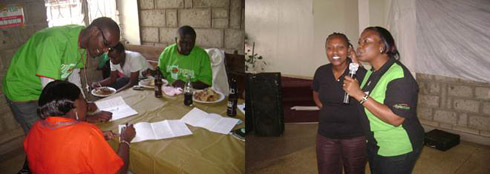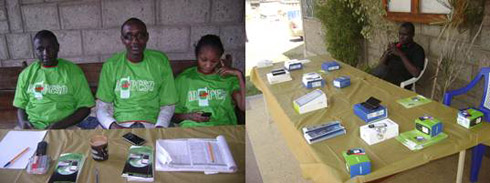In the latest in our guest blog series, Dr Ndunge Kiiti of Houghton College New York, describes findings of her research into the impact of mobile money services into female poverty reduction in Kenya. Her first blog entry described the findings of a workshop at which representatives from women’s groups discussed the benefits and challenges they encountered when using mobile money as part of their poverty reduction activities. Part 2 of Dr Kiiti’s entry outlines how M-PESA service providers responded to the feedback given in the workshop.
M-PESA Responds
The M-PESA staff members were grateful for the feedback provided by the women’s groups. First, the workshop provided them with a broader context in which to understand how these groups were using their services in the rural areas. Second, they were able to spend quality time explaining how the women might confront and address some of the challenges they have faced as a result of the services. The challenges and M-PESA’s suggested responses are listed below.
Fraud
Several of the women had lost money to fraud. The M-PESA staff acknowledged the women’s concerns and highlighted that reported cases were always investigated. They emphasized several tips to prevent M-PESA fraud including:
• Calling M-PESA to confirm the request prior to responding to a text message regarding their account (the phone number, which would require a small fee, was provided)
• Checking to see if the text message is actually from M-PESA – if it was it would have the M-PESA logo and/or name)
• Being aware of their account balance
• Ensuring their pin number is always kept safe
It was also brought to the groups’ attention that M-PESA has introduced a new Safaricom SIM card which allows individuals to save the phone numbers used for M-PESA transactions. This enables the individual to just scroll and pick the accurate number instead of having to retype the number every time it is used. This reduces the problem of sending money to the wrong number. The M-PESA staff provided the SIM card service at the workshop and many of the women paid for the service and got their old SIM cards replaced. The women expressed gratitude for the service.

1. MPESA staff helped women register for new services 2. MPESA staff address challenges
Network/Connectivity Problems
Why some areas face network problems was explained by the M-PESA staff. The company recognizes that network coverage is a problem in some rural areas. A key challenge for M-PESA is the platform or technology has faced limitations in keeping up with the demand, as the users of the service continue to increase across the country. The women were encouraged to report coverage issues to an M-PESA outlet, if there is one in their area, rather than an agent. They were also given a number to call or text, when they have access to service, to report these complaints to give the service provider the opportunity to rectify the problems. Again, this would require a small fee.
Cost
The challenge of cost for service was discussed; even though the service was deemed very useful by users, sometimes the costs involved proved challenging for them. The M-PESA staff explained their service costs, what they entail and how they have worked to keep them affordable for Kenyans. There was mutual agreement that M-PESA has tried to be fair in terms of pricing. In fact, it came out in the conversation that one of the reasons it was being used by all 21 women’s groups was because it was the most competitive in the mobile money market.

1. MPESA staff provides women’s groups with services 2. MPESA staff markets and sells products
Services for Special Populations
In relation to services for special populations, such as the elderly, illiterate or visually impaired, there were no easy answers. M-PESA staff suggested that they would look into the possibilities of programs that might assist special populations to have positive experiences with their service.
Group Communication and Dynamics
On one hand, mobile money allows for money to be sent to facilitate planning at meetings, even if a member needs to be absent. However, some groups argued this can perpetuate the lack of meeting attendance, thus limiting the social aspects of the group meeting and affecting the socio-psychological support that comes from face-to-face group interactions. Since this issue relates more to the training and capacity building carried out by those running women’s groups, it was not addressed by the M-PESA in detail. However, representatives of the organization running the women’s groups encouraged members not to allow the use of technology to erode or limit their face-to-face communication by not attending meetings. The groups were encouraged to continue reminding members that a key part of their mission is being a support system for one another which require face to face communication.
Summary
Overall, despite the numerous challenges mentioned, the groups made it clear that the benefits of using mobile money services outweighed the disadvantages. In addition, bringing together M-PESA staff and their end users was mutually beneficial. The women’s groups were able to gain information, knowledge and services that will continue to help them with their poverty reduction activities. The M-PESA staff were able to garner insights and understanding that may contribute to framing policies and practice for mobile money services.
What experience do you have of the impacts of mobile money of group saving in emerging markets? Can you offer additional suggestions to making the user experience even more secure and effective? We’d love to hear your thoughts below.

